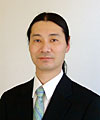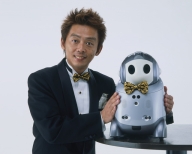Professor Masa Inakage, Keio University, Japan
 Media
Design Aesthetics: Emotional and Entertaining Experience Design for
the Ubiquitous Society
Media
Design Aesthetics: Emotional and Entertaining Experience Design for
the Ubiquitous Society
Abstract: Our society is in the midst of paradigm shift
from mass media-based society to personal media-based society,
driven by the digital revolution. Mass media and communication media
are converging to form massively connected personal and everywhere
media. In the personal and everywhere media, the interaction of
people, artifacts, and the environment contributes to the emotional
and entertaining experience in the daily life. Thus, the experience
design is the core activity of media design, and aesthetics is the
key component in the media design formula. The talk touches various
areas of media design through the lens of content design and
supporting technology research drawing on the recent research
projects at Keio University, including digital cinema, ubiquitous
contents, and participatory communities.
Masa
Inakage is a Professor of the Faculty of Environmental
Information at Keio University and the President of the Media Studio. He
is an internationally-renowned digital artist, director, and
producer. He is one of Japan's leading authorities on emerging
technologies and digital entertainment content production. His
artworks and animation works have been shown internationally at
galleries and festivals. He has spoken widely and delivered numerous
papers and articles on the subject of computer graphics and digital
entertainment as well as business strategies. He is actively
involved in variety of projects, including feature films, broadcast
programs, interactively displays and events. His current research
projects include digital cinema, digital entertainment, media
design, and ubiquitous content design. He is a member of ACM SIGGRAPH and
Visual Effects Society.
Junichi
Osada (NEC Design, Ltd.) and Zenjiro (YOSHIMOTO KOGYO, Ltd.),
Japan
 Research
Collaboration for “Humorous Interaction”
Research
Collaboration for “Humorous Interaction”
2-Man
Stand-Up Comedy (Manzai) with a Robot
More
details at: http://www.incx.nec.co.jp/robot/english/papejiro/index.html
Abstract: We are now in the process of developing
PaPe-jiro as part of our research in human-robot communication. For
a robot companion in the home, the mere ability to assist the family
with various chores is not enough; it also needs to be able to
converse with family members in a pleasant way, so that they develop
a fondness for it. We feel that this is one of the most important
aspects of our current robot research and development. In
collaboration with well-known Japanese comedian Zenjiro, we tackled
this challenge by focusing on developing the robot's sense of humor.
In this experiment, PaPe-jiro joined Zenjiro onstage as the
"straight man" to his comedy routine. This allowed us to
explore the possibility of the robot's ability to laugh and joke, as
well as search for an appropriate brand of robot-specific humor.
Junichi
Osada is a senior designer at NEC Design, Ltd. He is also an
adjunct instructor at the Faculty of Art and Communication Evening
Division in Tama Art University. He is in charge of the art
direction of the personal robot - "PaPeRo", and the
research and development activities in the NEC Central laboratory.
He is one of few designers who have experience in designing personal
robot in Japan. His design works and researches are based on
interaction design with music and sound. In the PaPeRo development,
he focused on the communications between human and robot. He models
the behavior of all robots as design objects. They are motion, tone
of the voice, scripts by text-to-speech synthesis, sound/music
effects, and words of voice-recognition, etc. As for these design
objects, the art direction by using the dimension of
"Tempo" of music is his original work. He also advances
the cultural science collaboration research in the area of robot
research with the sociology , social psychology, clinical psychology
and philosophy. The collaboration with different domains is
practiced, and one of the aims of his activities is to cultivate this novel
research areas. At the University, he takes care of Sound and Music
design exercises. He is a member of JSSD, JPA, and JCSS.
 Zenjiro
became an assistant of a famous comedian, Ryutaro Kamioka in 1986.
His first stage was "Kibun wa Jamaica" comedy show on
Yomiuri TV in 1987. He appears as regular host on a lot of TV and Radio
shows. His Representative program is "TEREBI NO TSUBO". He
has started challenging himself performing in English and performed
all over the world since 1999. He appeared in "Stand up
night" on HBO, USA, "Adam & Joe Show"on BBC,
UK,"Just for laughs" on CBC, Canada. Zenjiro also has a
strong interest in New type of Comedy culture. He has started
performing with Robot and performed in 2003. He made talking comedy
Robot jointly with NEC company. He and robot have been the guest on
the BBC "Japanorama" TV program in 2006. He hopes to
continue his acting work and joint development to make funny jokes
with Robot at all over the world.
Zenjiro
became an assistant of a famous comedian, Ryutaro Kamioka in 1986.
His first stage was "Kibun wa Jamaica" comedy show on
Yomiuri TV in 1987. He appears as regular host on a lot of TV and Radio
shows. His Representative program is "TEREBI NO TSUBO". He
has started challenging himself performing in English and performed
all over the world since 1999. He appeared in "Stand up
night" on HBO, USA, "Adam & Joe Show"on BBC,
UK,"Just for laughs" on CBC, Canada. Zenjiro also has a
strong interest in New type of Comedy culture. He has started
performing with Robot and performed in 2003. He made talking comedy
Robot jointly with NEC company. He and robot have been the guest on
the BBC "Japanorama" TV program in 2006. He hopes to
continue his acting work and joint development to make funny jokes
with Robot at all over the world.